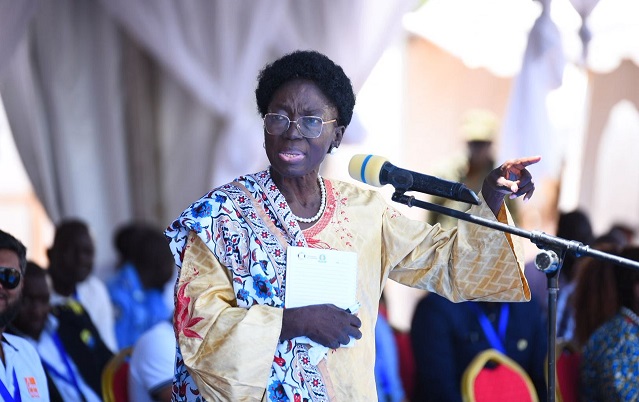
The First Deputy Prime Minister and Minister for East African Community Affairs, Rebecca Alitwala Kadaga, has criticized the Ministry of Health for failing to declare an outbreak of Cholera in Amuru district despite rising deaths and infections.
Speaking on Wednesday at the launch of the construction works for the multibillion-dollar climate-resilient and gender responsive cross-border market in Elegu Town Council, Kadaga questioned why the Health Ministry had remained silent on the alarming cholera situation.
This came as the local leaders in Amuru district briefed Kadaga about their struggles to contain the highly contagious diarrheal disease at the Uganda-South Sudan border without an declaration of an emergency from the Health Ministry.
Geoffrey Osborn Oceng, the Amuru Resident District Commissioner, noted that despite the cholera situation being presented on the floor of Parliament, the Health Ministry has done very little response in terms of intervention.
Oceng alleged that during one of the virtual engagements while reporting about the cholera situation, the Health Ministry told him they cannot declare an emergency of cholera because it will affect the economy.
However while responding to their concerns, Kadaga said she was surprised by that the Health Minister Dr Jane Ruth Aceng hadn’t declared an emergency for a health situation that is already killing residents of Elegu Town Council.
“Now, I’m surprised that the Ministry of Health does not want to declare an emergency concerning cholera. I’m going to take up on it…,” said Kadaga.
She noted that in any case if the Ministry of Health isn’t interested in making an emergency declaration, it should at least pay attention to the situation to save the lives of the locals in Elegu Town Council.
The district leader’s concerns come amidst what health officials say was a recent spike in cases of Cholera following the death of another patient, a female money lender on Monday from Bibia Health Centre III, which has been at the forefront of the cholera fight.
Milton Okello, the in charge of Bibia Health Centre III, told Uganda Radio Network in an interview that so far five people have died from the facility since the cholera outbreak was registered on July 2nd in Lorikor West village in Elegu Town council.
Okello said the transmission of the disease has since spread to Lorikor East Village following a recent flood after the river Unyama burst its banks, adding that they started registering spikes on August 5.
He, however, expressed fears that with limited intervention in combating transmission, the cholera situation may take longer than they anticipated to fight. By Tuesday, a total of 12 patients had been admitted to Bibia Health Centre III, receiving medical treatment for acute diarrheal infection.
Efforts to get comments from the Health Minister, Dr Jane Ruth Aceng were futile as she didn’t answer this reporters phone calls. However, during a parliamentary session on July 31, Dr acknowledged the cholera situation in Amuru but downplayed the Ministry’s sole responsibility in fighting the disease.
Dr Aceng said Cholera is a sanitation disease which calls for a multi-sectral approach in fighting it, including the residents of Elegu Town Council and Amuru leaders.
Kassim Akule, the LCI Chairperson of Lorikor West Village, has, however, requested the government to allocate funding for the urgent construction of drainage channels within Elegu Town Council to combat floodwater spilling into domestic water sources.
Akule says whenever the river Unyama bursts its banks or it rains heavily, the flood water directly goes to the community because there isn’t any drainage channel, which he says contributes to the spread of water-borne diseases.
In a bid to contain the cholera situation from recurring, district officials have also requested the central government to make allocations for garbage skips and garbage trucks for waste management.
According to statistics from health officials, so far, 304 people have undergone admission and medical treatment at Bibia Health Centre III. Out of this figure, 292 tested positive for the disease using RDT kits, while 57 tested through PCR and Culture sensitivity.







